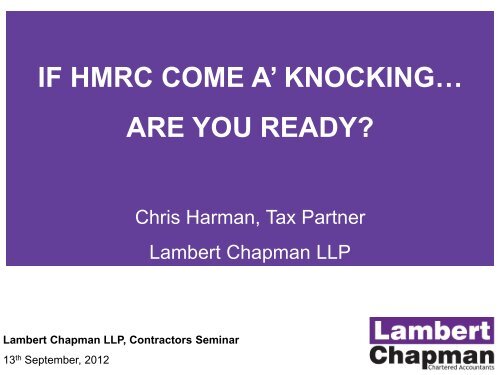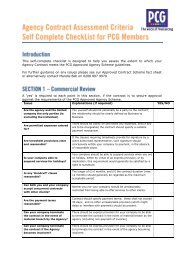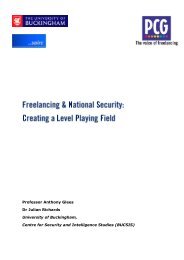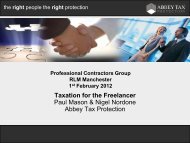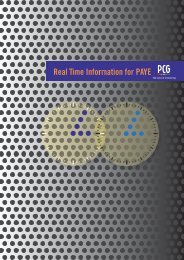Lambert Chapman LLP, Contractors Seminar - PCG
Lambert Chapman LLP, Contractors Seminar - PCG
Lambert Chapman LLP, Contractors Seminar - PCG
- No tags were found...
You also want an ePaper? Increase the reach of your titles
YUMPU automatically turns print PDFs into web optimized ePapers that Google loves.
IF HMRC COME A’ KNOCKING…ARE YOU READY?Chris Harman, Tax Partner<strong>Lambert</strong> <strong>Chapman</strong> <strong>LLP</strong><strong>Lambert</strong> <strong>Chapman</strong> <strong>LLP</strong>, <strong>Contractors</strong> <strong>Seminar</strong>13 th September, 2012
1) If HMRC come a’ knocking… are you ready?• HMRC tasked to collect an extra £600m over 4 years.• The checks will be risk based and target based.• HMRC plan to visit about 50,000 businesses eachcalendar year.<strong>Lambert</strong> <strong>Chapman</strong> <strong>LLP</strong>, <strong>Contractors</strong> <strong>Seminar</strong>13 th September, 2012
2) If your business is selected for a records check....• Firstly, don’t panic.• Secondly, speak to your accountant.<strong>Lambert</strong> <strong>Chapman</strong> <strong>LLP</strong>, <strong>Contractors</strong> <strong>Seminar</strong>13 th September, 2012
3) What records do you need to keep?There are statutory requirements:1. Statutory records are records that are required bythe Taxes Act or other legislation to be maintainedby a person or business.2. Maintain business records in order to make acorrect and complete return or claim.<strong>Lambert</strong> <strong>Chapman</strong> <strong>LLP</strong>, <strong>Contractors</strong> <strong>Seminar</strong>13 th September, 2012
4) You need to keep business records until the latestof...• The sixth anniversary of the end of the accountingperiod.• The date any enquiry into a tax return or accountsis completed by HMRC.• The date on which an enquiry window for a returncloses.<strong>Lambert</strong> <strong>Chapman</strong> <strong>LLP</strong>, <strong>Contractors</strong> <strong>Seminar</strong>13 th September, 2012
5) How HMRC will carry out the check…• HMRC will advise the business of the impendingcheck.• HMRC will then carry out the check.• HMRC will advise the business of the outcome ofthe check.<strong>Lambert</strong> <strong>Chapman</strong> <strong>LLP</strong>, <strong>Contractors</strong> <strong>Seminar</strong>13 th September, 2012
6) HMRC run the checks at 4 different levels…1. Remotely from HMRC offices.2. Mainly remotely but with a meeting.3. In-depth review if there are serious risks but notevasion.4. An in-depth review if evasion is an issue.<strong>Lambert</strong> <strong>Chapman</strong> <strong>LLP</strong>, <strong>Contractors</strong> <strong>Seminar</strong>13 th September, 2012
7) HMRC powers in requesting information…• HMRC legislation is wide ranging and has powersto obtain information.• HMRC can force production of documents.• HMRC has powers to inspect businesses.• HMRC can impose penalties.<strong>Lambert</strong> <strong>Chapman</strong> <strong>LLP</strong>, <strong>Contractors</strong> <strong>Seminar</strong>13 th September, 2012
8) HMRC powers to obtain information…• HMRC can request information verbally (but verbal requestsare not enforceable).• The taxpayer can appeal against a penalty or enquiry noticeif HMRC are asking for information to which they are notentitled.• HMRC can ‘reasonable require’ information.• Documents that are destroyed or concealed after HMRChave issued a notice is likely to lead to criminalproceedings.<strong>Lambert</strong> <strong>Chapman</strong> <strong>LLP</strong>, <strong>Contractors</strong> <strong>Seminar</strong>13 th September, 2012
9) HMRC powers to obtain information…• PRIVATE RECORDS:- Non-business private records such as personal bankaccounts should not be requested by HMRC as a matter ofcourse.• INFORMATION FROM THIRD PARTIES:- HMRC powers extend to notices that can be issued to thirdparties.- HMRC cannot have access to accountants ‘linkingdocuments’- Accountants records is a sensitive area with HMRC.<strong>Lambert</strong> <strong>Chapman</strong> <strong>LLP</strong>, <strong>Contractors</strong> <strong>Seminar</strong>13 th September, 2012
10) Production of Information• Businesses should decide where is the best placeto produce the documents:- Business Premises: this gives HMRC theopportunity to enter the premises.- Agents Premises: this is ‘neutral ground’.- Delivery to HMRC office: records can get lost,delayed etc.<strong>Lambert</strong> <strong>Chapman</strong> <strong>LLP</strong>, <strong>Contractors</strong> <strong>Seminar</strong>13 th September, 2012
11) HMRC visits to premises…• The current VAT legislation is wide-ranging andgives right of access to premises. No equivalentpower for HMRC re the inspection for PAYE orincome tax.• HMRC cannot search premises nor can theysearch for assets or documents.<strong>Lambert</strong> <strong>Chapman</strong> <strong>LLP</strong>, <strong>Contractors</strong> <strong>Seminar</strong>13 th September, 2012
12) HMRC visits to premises…• The occupier also has the right to refuse entry tothe premises or terminate the visit at the time.• Inspection can only go past the inspection ofstatutory records if:- the business agrees to it.- the business has been issued with a formalnotification.• The power does not apply to premises that areused solely as a private dwelling.• The visit must be a ‘reasonable time’.<strong>Lambert</strong> <strong>Chapman</strong> <strong>LLP</strong>, <strong>Contractors</strong> <strong>Seminar</strong>13 th September, 2012
13) Can you say ‘No’?• If HMRC want to gain access to premises, theoccupier has the right to refuse entry. HMRCcannot override that right.• If during an inspection of the premises the occupierasks HMRC to leave the premises, they must do soimmediately.<strong>Lambert</strong> <strong>Chapman</strong> <strong>LLP</strong>, <strong>Contractors</strong> <strong>Seminar</strong>13 th September, 2012
14) Computer Records• HMRC have the power to inspect computerrecords. Care should be taken to ensure computerrecords are compartmentalised.• Computer records can be the actual computerserver, or, if there are external devices, those arealso included.<strong>Lambert</strong> <strong>Chapman</strong> <strong>LLP</strong>, <strong>Contractors</strong> <strong>Seminar</strong>13 th September, 2012
15) Closing the Inquiry• If errors are found, then HMRC will discuss these.• Negotiations on figures to be adjusted.• Statement of assets likely to be required by HMRC.• Certificate of full disclosure likely to be required byHMRC.<strong>Lambert</strong> <strong>Chapman</strong> <strong>LLP</strong>, <strong>Contractors</strong> <strong>Seminar</strong>13 th September, 2012
THANK YOU FOR LISTENINGChris Harman, Tax Partner<strong>Lambert</strong> <strong>Chapman</strong> <strong>LLP</strong><strong>Lambert</strong> <strong>Chapman</strong> <strong>LLP</strong>, <strong>Contractors</strong> <strong>Seminar</strong>13 th September, 2012
TRAVEL EXPENSES& THE 24 MONTH RULEDuncan Forsyth, Senior Manager<strong>Lambert</strong> <strong>Chapman</strong> <strong>LLP</strong><strong>Lambert</strong> <strong>Chapman</strong> <strong>LLP</strong>, <strong>Contractors</strong> <strong>Seminar</strong>13 th September, 2012
What is the 24 month rule?• The cost of travel from home (being the permanentplace of work) to a temporary work place can beclaimed for up to 24 months.• Once it is known that a contract will exceed 24months, the cost of travel is no longer tax deductibleand becomes ordinary commuting.<strong>Lambert</strong> <strong>Chapman</strong> <strong>LLP</strong>, <strong>Contractors</strong> <strong>Seminar</strong>13 th September, 2012
What is ordinary commuting?• This is what an employee undertakes in travellingfrom home to a normal place of work.• After 24 months, this also applies to contractorsworking through a limited company or an MSC.• Costs of travelling to a temporary work place only aretax deductible.<strong>Lambert</strong> <strong>Chapman</strong> <strong>LLP</strong>, <strong>Contractors</strong> <strong>Seminar</strong>13 th September, 2012
What travel costs can be claimed?• Train, coach or bus journeys.• Car journeys including mileage.• Taxi fares.• Air fares.• As with all expenses, you should keep records…Receipts, mileage logs etc.<strong>Lambert</strong> <strong>Chapman</strong> <strong>LLP</strong>, <strong>Contractors</strong> <strong>Seminar</strong>13 th September, 2012
Would a new contract restart the clock?• If you have a 12 month contract okay, claim travelcosts.• If you have a 6 month extension to the contract, stillokay to claim.• A further 6 month extension would push thecontract to 24 months and no claim would beallowed for the last 6 month contract.• So no, contracts are added together.<strong>Lambert</strong> <strong>Chapman</strong> <strong>LLP</strong>, <strong>Contractors</strong> <strong>Seminar</strong>13 th September, 2012
Will a contract with a new client restart the clock?• It depends…• If the journey to the new client is not considered to besubstantially different to the previous one, it will be looked atas the same journey and count towards the 24 months.• If both clients are in the City, this will be considered to bethe same journey.• It is the journey that is important not who the end user clientis.<strong>Lambert</strong> <strong>Chapman</strong> <strong>LLP</strong>, <strong>Contractors</strong> <strong>Seminar</strong>13 th September, 2012
What if there is a break in the contract?• Breaks in contracts will be ignored for the purposesof calculating the 24 months.• If you spend 18 months, have a 3 month break andthen take another 6 month contract, you would beat the same work place for 24 months.• A further test is applied in this case, the 40% test.<strong>Lambert</strong> <strong>Chapman</strong> <strong>LLP</strong>, <strong>Contractors</strong> <strong>Seminar</strong>13 th September, 2012
What is the 40% test?• The 40% test states that if you do not spend at least 40% ofyour time at a work place, the 24 month rule will not apply.• If you work from home 3 days and at the clients on the other2 days, you will not have to apply the 24 month rule and alltravel costs will be tax deductible.• It has been argued that many contracts are not 9 to 5 andweekend and evening home working is required for on-timecompletion. If you record all your time on a time sheet andcan then prove that less than 40% of your time is at theclients premises you have an argument, all be it perhaps aweak one, that the 40% rule precludes the 24 month rule.<strong>Lambert</strong> <strong>Chapman</strong> <strong>LLP</strong>, <strong>Contractors</strong> <strong>Seminar</strong>13 th September, 2012
If a 24 month contract turns out to be shorter, can Iclaim all the travel?• One would think you should be able to do so.However, HMRC state that no travel costs aredeductible if the contract is over 24 months. Onceit is known that it will not be 24 months, travel canbe claimed from that point only.<strong>Lambert</strong> <strong>Chapman</strong> <strong>LLP</strong>, <strong>Contractors</strong> <strong>Seminar</strong>13 th September, 2012
Examples…• See the notes at the end of the slides for thissession.1. Mr Grey.2. Ms H Back3. Mr C Santana<strong>Lambert</strong> <strong>Chapman</strong> <strong>LLP</strong>, <strong>Contractors</strong> <strong>Seminar</strong>13 th September, 2012
Consider the following:• The length of each contract – why take a longcontract from the start?• The 40% rule – can you work from home for part ofthe time?• A new contract with a different end user will notnecessarily restart the 24 month clock.<strong>Lambert</strong> <strong>Chapman</strong> <strong>LLP</strong>, <strong>Contractors</strong> <strong>Seminar</strong>13 th September, 2012
What are the risks of getting this wrong?• A potentially large tax bill and penalties imposed byHMRC.• An in-depth enquiry into your company andpersonal tax affairs.• Do you have professional fee insurance to coverthe cost of an investigation?<strong>Lambert</strong> <strong>Chapman</strong> <strong>LLP</strong>, <strong>Contractors</strong> <strong>Seminar</strong>13 th September, 2012
Thank you for attending.<strong>Lambert</strong> <strong>Chapman</strong> <strong>LLP</strong> hope you have found thisinformation useful.If you require any further information on this topic,please contact Duncan Forsyth or Chris Harman.Telephone: 01376 326266E-mail: duncan.forsyth@lambert-chapman.co.ukE-mail: chris.harman@lambert-chapman.co.uk<strong>Lambert</strong> <strong>Chapman</strong> <strong>LLP</strong>, <strong>Contractors</strong> <strong>Seminar</strong>13 th September, 2012
Tax Efficient Strategies Incorporating PensionsUnizone Limited 2012
Comparing Income Tax Rates - IndividualsRate Currently 2013/2014Personal Allowances £8,105 £9,205Reduced by £1 for every £2 of income over £100,000Basic Rate – ignoring startingrate for savings £2,710 2012/2013Ordinary dividend rate 10%20% Up to £34,370 Up to £32,245Higher Rate 40% £34,371-£150,000 £32,246-£150,000Dividend upper rate 32.5%Additional Rate2012/20132013/201450%45%Over £150,000Over £150,000Dividend Additional Rate2012/20132013/201442.5%37.5%Unizone Limited 2012
Company with £300k profit or less.Higher Rate tax Paying Director0% Corporation Tax0% Company NI0% Income Tax0% Personal NIRetain in company20% Corporation Tax0% Company NI0% Income Tax0% Personal NIPension20% Corporation Tax0% Company NI32.5% Income Tax0% Personal NIProfit£50kDividendsSalary/Bonus0% Corporation Tax13.8% Company NI40% Income Tax2% Personal NIUnizone Limited 2012
Getting The Mix RightProfitCompany Pension ContributionSalaryDirector’s net disposable incomeTotal tax and NIC paidTotal tax and NIC as % of profitTotal benefit to director as % of profitAll Salary100,000088,78258,27241,72841.73%58.27%Unizone Limited 2012
Getting The Mix RightProfitCompany Pension ContributionSalaryDividendAll Salary100,000088,7820Small salary,dividend &pension100,00020,0008,00057,543Director’s net disposable incomeGross pension contributionTotal benefit to directorTotal tax and NIC paidTotal tax and NIC as % of profitTotal benefit to director as % of profit58,272058,27241,72841.73%58.27%58,86620,00078,86621,13421.13%78.87%Unizone Limited 2012
Profit Extraction – Using Pensions: The BenefitsCompany Pension Contribution 50,000£PAYE and NIC Savings 19,90825% Tax Free Lump Sum 12,500Net Pension Fund 37,500Unizone Limited 2012
Profit Extraction – Using Pensions: The Benefits•The introduction of pension contributions in additionto salary can improve tax efficiency.•Help meet the personal needs of directors andpotentially reduce tax•CT relief on Company contributions•Marginal rate of income tax relief up to 50% forindividuals•Grows tax free (with exemption of withholding tax ondividends)•Death benefits normally IHT free•25% tax free cash in retirement•Remainder used to purchase income – wide choice•Wide investment choice•Advantages of SIPPs and SSASUnizone Limited 2012
Property Purchase Using a SIPPCOMPANYSIPPLeaseCOMMERCIALPROPERTYRentAllowable businessexpenseRent : IT free, Gain: CGT free, and IHT free (vs. 50% BPR)CARE: Transferring property to SIPP – potential CGTUnizone Limited 2012
Relevant Life Assurance•Life assurance – personally pay out of net income.•Alternative:•Relevant Life AssuranceUnizone Limited 2012
Relevant Life Assurance•What Is it?•Company pays premiums on behalf of director•Where a group plan is not viable.•Business expense so tax deductible ( tax efficientfrom a personal view point as not paying out of netincome – double benefit)•No benefit in kind•Written in trust – IHT efficient.Unizone Limited 2012
Thank you for attendingIf you require any further information on this topic,please contact Bob Sparrowhawk.Telephone: 01376 564640E-mail: bob@unizone.org.ukUnizone Limited 2012
QUESTIONSChris Harman, <strong>Lambert</strong> <strong>Chapman</strong> <strong>LLP</strong>Duncan Forsyth, <strong>Lambert</strong> <strong>Chapman</strong> <strong>LLP</strong>Bob Sparrowhawk, Unizone<strong>Lambert</strong> <strong>Chapman</strong> <strong>LLP</strong>, <strong>Contractors</strong> <strong>Seminar</strong>13 th September, 2012


